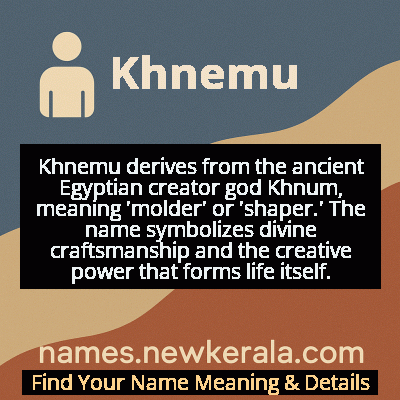Khnemu Name Meaning & Details
Origin, Popularity, Numerology Analysis & Name Meaning of Khnemu
Discover the origin, meaning, and cultural significance of the name KHNEMU. Delve into its historical roots and explore the lasting impact it has had on communities and traditions.
Name
Khnemu
Gender
Male
Origin
Egyptian
Lucky Number
9
Meaning of the Name - Khnemu
Khnemu derives from the ancient Egyptian creator god Khnum, meaning 'molder' or 'shaper.' The name symbolizes divine craftsmanship and the creative power that forms life itself.
Khnemu - Complete Numerology Analysis
Your Numerology Number
Based on Pythagorean Numerology System
Ruling Planet
Mars
Positive Nature
Generous, passionate, energetic, and humanitarian.
Negative Traits
Impulsive, impatient, moody, and can be overly emotional.
Lucky Colours
Red, maroon, scarlet.
Lucky Days
Tuesday.
Lucky Stones
Red coral, garnet.
Harmony Numbers
1, 2, 3, 6.
Best Suited Professions
Military, sports, philanthropy, leadership roles.
What People Like About You
Courage, energy, leadership, generosity.
Famous People Named Khnemu
Khnum
Ancient Egyptian deity
Creator god who molded humans from clay on his potter's wheel, associated with the Nile's source and fertility
Khnum-hotep
Ancient Egyptian official
High official and nomarch during Middle Kingdom, known from tomb inscriptions at Beni Hasan
Khnum-ib-re
Ancient Egyptian prince
Royal son of Pharaoh Khufu, involved in pyramid construction projects
Name Variations & International Equivalents
Click on blue names to explore their detailed meanings. Gray names with will be available soon.
Cultural & Historical Significance
The name Khnemu embodies the Egyptian concept of divine craftsmanship and the belief that human life was literally molded by divine hands, connecting every individual to the creator's touch. Throughout Egyptian history, from the Old Kingdom through the Ptolemaic period, Khnum maintained his importance despite changes in the pantheon, demonstrating the enduring appeal of his creative and life-sustaining attributes. His role expanded over time to include protection of the Nile's sources and ensuring the annual flood that made Egyptian civilization possible, making him integral to both spiritual beliefs and practical survival.
Extended Personality Analysis
Individuals named Khnemu are often perceived as creative, methodical, and deeply connected to tradition. Like the god who meticulously shaped humanity, they tend to be careful craftsmen in their endeavors, whether in artistic pursuits, professional work, or personal relationships. There's a strong sense of responsibility and nurturing quality, reflecting the deity's role in sustaining life through the Nile's fertility. They typically exhibit patience and attention to detail, preferring to build things gradually rather than rushing processes.
At the same time, they may possess a quiet strength and resilience, much like the enduring nature of their namesake deity who maintained his significance across millennia of Egyptian history. Their creative impulses are often balanced with practical application, making them effective at bringing ideas into tangible reality. They tend to be protective of those they care about and may show a particular affinity for water, art, or history. The name suggests someone who values legacy and lasting impact, preferring to create things of enduring quality rather than temporary achievements. Their approach to life is often systematic and deliberate, with a deep appreciation for the process of growth and development.
Modern Usage & Popularity
In contemporary times, Khnemu remains an exceptionally rare given name, primarily used by families with strong connections to Egyptian heritage or those deeply interested in ancient Egyptian culture. It sees occasional usage in academic circles, among Egyptologists, and in neo-pagan communities that draw inspiration from Egyptian mythology. The name hasn't appeared in modern popularity charts and maintains an exotic, scholarly aura. Its usage is almost exclusively masculine and often chosen for its powerful mythological associations rather than contemporary naming trends. Some parents select it to honor Egyptian ancestry or to express appreciation for ancient civilizations and their enduring cultural legacy. The name's complexity and unfamiliar sound to most modern ears ensure it remains distinctive and memorable, appealing to those seeking a name with deep historical roots and strong symbolic meaning.
Symbolic & Spiritual Meanings
Khnemu symbolizes creation, craftsmanship, and the fundamental shaping of existence. The name carries deep metaphorical weight as representing the potter who molds reality itself, embodying the concept that life and form emerge from careful, intentional design. It signifies transformation from raw material into finished being, making it symbolic of artistic creation, personal development, and the nurturing of potential. The association with the Nile's life-giving waters adds layers of meaning related to fertility, sustenance, and cyclical renewal. As a name, Khnemu suggests someone who brings order from chaos, who shapes their destiny with deliberate hands, and who connects the earthly with the divine through acts of creation and preservation. It represents the bridge between imagination and manifestation, between potential and actualization, making it powerfully symbolic for anyone involved in creative, educational, or transformative work.

